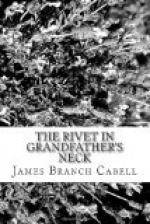“Harry is—her boy?” Anne, being vexed, had almost added—“and yours?”
“Oh——! Say the fons et origo of the Pendomer divorce case, poor little chap. Yes, Harry is her boy.”
Anne said, and again, as she perceived within the moment, a thought too expeditiously: “I wish you wouldn’t bring them here, Colonel Musgrave.”
Indeed, it seemed to her flat desecration that Musgrave should have brought his former mistress into this hallowed plot of ground. She did not mind—illogically, perhaps—his bringing the child.
“Eh——? Oh, yes,” said Colonel Musgrave. He was sensibly nettled. “You wish ‘Colonel Musgrave’ wouldn’t bring them here. But then, you see, we had been to Patricia’s grave. And we remembered how Jack stood by us both when—when things bade fair to be even more unpleasant for Clarice and myself than they actually were. You shouldn’t, I think, grudge even such moral reprobates the privilege of being properly appreciative of what he did for both of us. Besides, you always come on Saturdays, you know. We couldn’t very well anticipate that you would be here this afternoon.”
So he had been at pains to spy upon her! Anne phrased it thus in her soul, being irritated, and crisply answered:
“I am leaving Lichfield to-morrow. I had meant this to be my farewell to them until October.”
Colonel Musgrave had glanced toward the little headstone, with its rather lengthy epitaph, which marked the resting-place of this woman’s only child; and then to the tall shaft whereon was engraved just “John Charteris.” The latter inscription was very characteristic of her view-point, he reflected; and yet reasonable, too; as one might mention a Hector or a Goethe, say, without being at pains to disclaim allusion to the minor sharers of either name.
“Yes,” he said. “Well, I shall not intrude.”
“No—wait,” she dissented.
Her voice was altered now, for there had come into it a marvelous gentleness.
And Colonel Musgrave remained motionless. The whole world was motionless, ineffably expectant, as it seemed to him.
Sunset was at hand. On one side was the high wooden fence which showed the boundary of Cedarwood, and through its palings and above it, was visible the broad, shallow river, comfortably colored, for the most part, like cafe au lait, but flecked with many patches of foam and flat iron-colored rocks and innumerable islets, some no bigger than a billiard-table, but with even the tiniest boasting a tree or two. On the other—westward—was a mounting vista of close-shaven turf, and many copings, like magnified geometrical problems, and a host of stunted growing things—with the staid verdancy of evergreens predominant—and a multitude of candid shafts and slabs and crosses and dwarfed lambs and meditant angels.
Some of these thronged memorials were tinged with violet, and others were a-glitter like silver, just as the ordered trees shaded them or no from the low sun. The disposition of all worldly affairs, the man dimly knew, was very anciently prearranged by an illimitable and, upon the whole, a kindly wisdom.




